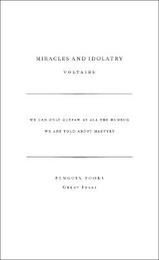
|
Miracles and Idolatry
Paperback / softback
Main Details
| Title |
Miracles and Idolatry
|
| Authors and Contributors |
By (author) Voltaire
|
|
Translated by Theodore Besterman
|
| Series | Penguin Great Ideas |
|---|
| Physical Properties |
| Format:Paperback / softback | | Pages:144 | | Dimensions(mm): Height 181,Width 111 |
|
| Category/Genre | Western philosophy - c 1600 to c 1900 |
|---|
| ISBN/Barcode |
9780141023922
|
| Classifications | Dewey:194 |
|---|
| Audience | | General | | Tertiary Education (US: College) | | Professional & Vocational | |
|---|
|
Publishing Details |
| Publisher |
Penguin Books Ltd
|
| Imprint |
Penguin Books Ltd
|
| Publication Date |
25 August 2005 |
| Publication Country |
United Kingdom
|
Description
Throughout history, some books have changed the world. They have transformed the way we see ourselves - and each other. They have inspired debate, dissent, war and revolution. They have enlightened, outraged, provoked and comforted. They have enriched lives - and destroyed them. Now Penguin brings you the works of the great thinkers, pioneers, radicals and visionaries whose ideas shook civilization and helped make us who we are. Voltaire's short, radical and iconoclastic essays on philosophical ideas from angels to idolatry, miracles to wickedness, make wry observations about human beliefs, and mock hypocrisy and extravagant piety - his call to his fellow men to act with reason and see through the lies they are fed by their leaders has provided inspiration to freethinkers everywhere.
Author Biography
Francois-Marie Arouet, writing under the pseudonym Voltaire, was born in 1694 into a Parisian bourgeois family. Educated by Jesuits, he was an excellent pupil but one quickly enraged by dogma. An early rift with his father - who wished him to study law - led to his choice of letters as a career. Insinuating himself into court circles, he became notorious for lampoons on leading notables and was twice imprisoned in the Bastille. By his mid-thirties his literary activities precipitated a four-year exile in England where he won the praise of Swift and Pope for his political tracts. His publication, three years later in France, of Lettres philosophiques sur les Anglais (1733) - an attack on French Church and State - forced him to flee again. For twenty years Voltaire lived chiefly away from Paris. In this, his most prolific period, he wrote such satirical tales as Zadig (1747) and Candide (1759). His old age at Ferney, outside Geneva, was made bright by his adopted daughter, 'Belle et Bonne,' and marked by his intercessions on behalf of victims of political injustice. Sharp-witted and lean in his white wig, impatient with all appropriate rituals, he died in Paris in 1778 - the foremost French author of his day.
|